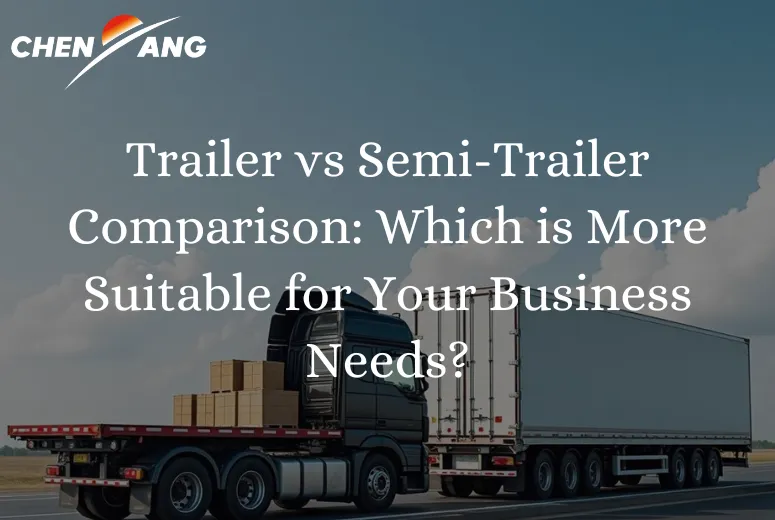Trailer vs Semi-Trailer Comparison: Which is More Suitable for Your Business Needs?
In the field of logistics and transportation, choosing the right carrier is crucial for the efficient operation of your business. Trailers and semi-trailers, as common transportation equipment, each have their unique advantages and application scenarios. If you are considering whether to choose a refrigerated trailer, an enclosed trailer, or a fuel trailer, understanding the differences between trailers and semi-trailers can help you make the best decision. CHENYANG, a company with rich experience in the trailer factory field, provides you with professional analysis.

Trailers and semi-trailers: Cargo Capacity and Space Utilization
Semi-trailers usually have a larger cargo space and higher load-bearing capacity. Their body design can be flexibly matched with tractors, enabling the transportation of bulky and heavy goods, such as large mechanical equipment and construction materials. For example, in long-distance freight container transportation, semi-trailers can easily carry standard containers, achieving efficient cargo turnover. In contrast, trailers have relatively smaller cargo-carrying capacity and space, making them more suitable for transporting small and scattered goods. However, for some special goods, such as refrigerated products that require precise temperature control, although the cargo-carrying capacity of a refrigerated trailer is less than that of a large semi-trailer, it can provide a stable low-temperature environment for the goods, ensuring the quality of the goods. Enclosed trailers can effectively protect goods from the external environment and are suitable for transporting valuable items or goods sensitive to the environment.
Trailers and semi-trailers: Maneuverability and Operational Convenience
Trailers have obvious advantages in maneuverability. Due to their smaller size and relatively simple structure, they are easier to operate and turn in spaces such as urban streets and narrow sites. For example, in the urban distribution business, trailers can flexibly shuttle through the streets and alleys and quickly complete the loading and unloading of goods. Custom trailers can also be customized with special structures and functions according to specific business needs, further enhancing their operational convenience in specific scenarios. In contrast, new semi-trailers for sale are relatively more complex in operations such as turning radius and parking due to their longer body length and require higher driving skills from drivers. However, on open roads such as highways, semi-trailers can achieve efficient long-distance transportation with their stable driving performance.
Trailers and semi-trailers: Cost Considerations
In terms of procurement costs, equipment trailers for sale usually have a relatively lower price, which is an important advantage for small-scale enterprises or start-ups with limited budgets. In addition, the maintenance cost of trailers is relatively low. Because of their simple structure and fewer components, the difficulty and cost of maintenance and repair are relatively low. New semi-trailers for sale, due to their complex technology and numerous components, have higher procurement and maintenance costs. However, in long-term operations, if the business volume is large and the transportation distance is long, semi-trailers may have a lower unit transportation cost due to their high cargo-carrying capacity and efficient transportation capacity. Taking a fuel trailer as an example, if it is used for large-scale fuel transportation, the amount of fuel transported by a semi-trailer at one time is much more than that of a trailer. While meeting a large amount of demand, the transportation cost per liter of fuel will be reduced.
Trailers and semi-trailers: Applicable Business Scenarios
If your business is mainly concentrated on short-distance distribution within the city and the goods are diverse and small in volume, then trailers, especially enclosed trailers or custom trailers, may be a better choice. They can flexibly deal with the complex road conditions in the city and quickly deliver the goods. If you are engaged in long-distance trunk transportation, especially for transporting large and heavy goods, semi-trailers are undoubtedly the first choice. For some special industries, such as the cold chain logistics industry, the professionalism of refrigerated trailers can ensure the quality of perishable goods; in the energy transportation field, fuel trailers can meet industry needs with their large capacity and safety.
In conclusion, trailers and semi-trailers each have their own advantages and disadvantages. To choose which one is more suitable for your business needs, you need to comprehensively consider various factors such as cargo-carrying capacity, maneuverability, cost, and specific business scenarios. As a professional trailer factory, CHENYANG can provide you with various types of high-quality trailers and semi-trailers, helping you optimize your transportation plan and improve business efficiency. We hope that through the comparative analysis in this article, we can provide you with a clear idea of the selection of transportation equipment and help your business thrive.
-
Low Maintenance + High Availability of Ownership for Mining Dump TruckNewsJul.17,2025
-
Drum Drive Axle + Air Suspension for Electric Tractor TruckNewsJul.17,2025
-
33m Boom + Full Hydraulic Outriggers: Narrow-Site Construction Practices of Mixer Pump TruckNewsJul.17,2025
-
18L Large Drum + Extended Drain Interval of Gear Oil for Heavy Duty TrucksNewsJul.17,2025
-
13m Cargo Space + Polyurethane Insulation: Long-Term Cold Chain Protection Solutions for Refrigerated Semi-Trailers for SaleNewsJul.17,2025
-
10T Water Tank + 2.5MPa Fire Pump Efficiency Analysis of Water Tank Fire TruckNewsJul.17,2025
Popular products

























